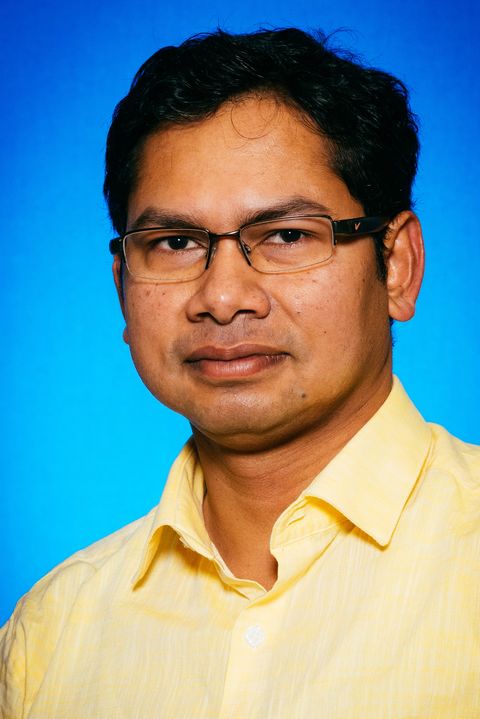
Biography
Dr. Ferdous is currently working as an Assistant Professor in mechanical engineering at Penn State Harrisburg. Before joining Penn State Harrisburg, he was an Assistant Professor at Indiana State University. Prior to that, he served as a Lecturer at the University of Massachusetts Dartmouth and as a Visiting Assistant Professor at Binghamton University – SUNY.
Dr. Ferdous has over a decade of computational experience using molecular dynamics simulations to study the mechanics of various materials, including ceramic composites, metals, biomaterials, and polymer composites. His teaching interests include capstone design, mechanics of materials, machine design, materials science, kinematics, and engineering economics. The core theme of Dr. Ferdous’s research is the development of multiscale computational models to understand the mechanical performance of advanced structural and biological materials. One of his research directions is investigating the fracture behavior of armor steel in a corrosive environment. Armor steel is a high-hardness steel (hardness ≥ 500) designed to meet specific standards and requirements. Due to microstructural changes during manufacturing, high-hardness steels often exhibit low toughness, making them more vulnerable to catastrophic failure in corrosive environments. This raises concerns about structural integrity and safety. Investigating steel degradation at the atomic level is essential to understanding the complex mechanisms underlying corrosion-induced failures. This research is conducted in collaboration with the U.S. Naval Research Laboratory.
Another research focus is recovering high-value energy materials from wastewater. Extracting these materials from aqueous waste streams is a promising approach to reducing the costs associated with domestic ammonia (NH₃) production and the extraction of critical metals, while also helping to lower greenhouse gas emissions. This research is conducted in collaboration with Idaho National Laboratory.
Dr. Ferdous is also involved in multiscale modeling and characterization of cytoskeletal components, which are responsible for maintaining cell shape and providing mechanical support. Understanding and predicting their mechanical behavior is crucial for advancing knowledge in cellular mechanics. This research is conducted in collaboration with the University of Texas at Arlington.
Another research direction focuses on designing patient- and injury-specific self-sensing bone scaffolds with optimized mechanical and biological properties. Bone tissue defects are a growing concern worldwide, affecting millions of people due to trauma, skeletal diseases, tumor resections, osteoporosis-related fractures, congenital bone malformations, and aging. There is an urgent need for bone regeneration solutions, and bone scaffolds play a pivotal role in supporting cellular response and proliferation. This research is conducted in collaboration with the University of South Florida and Indiana State University.
Research Interests
- Computational Materials Science
- Structural Analysis in Harsh Environment
- Recovering high value energy materials from wastewater
- Characterizing cytoskeletal components for traumatic brain injury
- Smart Bone scaffolds
- Ceramic based composite for resilient structure
- Polymer nanocomposites
- Defects, dislocations, and failure mechanism
- Engineering education
Publications
Ashfaq Adnan, Sheikh F. Ferdous, and Farzad Sarker, “Biomechanics of Mineralized Collagens”, in Multiscale Simulations and Mechanics of Biological Materials, First Edition. Edited by Shaofan Li and Dong Qian. © 2013 John Wiley & Sons, Ltd. Published 2013 by John Wiley & Sons, Ltd.
Md Ishak Khan, Sheikh Fahad Ferdous, and Ashfaq Adnan “Mechanical Behavior of Axonal Actin, Spectrin, and Their Periodic Structure: A Brief Review”, Multiscale Science and Engineering, Volume 3, 2021, pages 185–204.
Md Ishak Khan, Sheikh Fahad Ferdous, and Ashfaq Adnan “Mechanical Behavior of Actin and Spectrin Subjected to High Strain Rate: A Molecular Dynamics Simulation Study”, Computational and Structural Biotechnology Journal, Volume 19, January 2021, Pages 1738–1749.
Riaz Kayser, Sheikh Fahad Ferdous, and Ashfaq Adnan “The effect of combined electrical and thermal cyclic loading on the mechanical behaviour of HfO2 nanofilm. A molecular dynamics study”, Int. J. Computational Materials Science and Surface Engineering, Volume 9, Issue 3, October 2020, Pages 157–176.
Sheikh Fahad Ferdous, Ashfaq Adnan “Mode-I Fracture Toughness Prediction of Diamond at Nanoscale”, Journal of Nanomechanics and Micromechanics, Volume 7 (3), June 2017, Pages 04017010.
Ashfaq Adnan, Sheikh Fahad Ferdous “Mechanical Properties of Computationally Designed Novel Carbon Enriched Si1-xCx Ceramics: A Molecular Dynamics Simulation Study", Computational Materials Science, Volume 110, December 2015, Pages 331–339.
Ashfaq Adnan, Sheikh Fahad Ferdous “Computational Design of Novel Carbon Enriched Si1-xCxCeramics: A Molecular Dynamics Simulation Study", Computational Materials Science, Volume 96, January 2015, Pages 354–359. Sheikh F Ferdous, Ashfaq Adnan “Role of a Single Surface Vacancy on the Tensile Stress-strain Relations of Single Crystal Ni Nanowire", Computational Materials Science, Volume 90, July 2014, Pages 221–231.
Sheikh F Ferdous, Md. Farzad Sarker, Ashfaq Adnan " Role of Nanoparticle Dispersion and Filler- Matrix Interface on the Matrix Dominated Failure of Rigid C60-PE Nanocomposites: A molecular dynamics simulation study", Polymer, Volume 54, Issue 10, 26 April 2013, Pages 2565–2576.
Education
Ph.D., Mechanical Engineering, University of Texas at Arlington, USA.
B.Sc., Mechanical Engineering, Bangladesh University of Eng. & Tech (BUET).